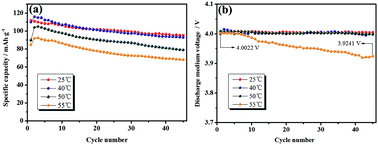Investigation on the temperature tolerance of LiMn2O4 in lithium-ion batteries
Abstract
LiMn2O4 is one of the most popular cathode materials for lithium-ion batteries. However, temperature is one of the important factors that affects the electrochemical performance of materials. In this study, the electrochemical performance and capacity fade mechanism of LiMn2O4 at different temperatures (25 °C, 40 °C, 50 °C and 55 °C) have been investigated. The results show that the capacity degradation is not significant and the capacity retention rate is relatively high when the temperature is lower than 40 °C. Moreover, the EIS results show that the impedance of the battery is the smallest at 40 °C. This means that 40 °C is an appropriate temperature for the battery with aging cycles. With the increase in the temperature, the thickness of the SEI films also increases, which will severely hinder the transport of lithium-ions, and eventually lead to the serious degradation of the battery capacity and an increase in polarization. Therefore, the capacity losses of the batteries at different temperatures are analyzed, which provide a theoretical basis for the future development of LiMn2O4 and have important reference significance.



 Please wait while we load your content...
Please wait while we load your content...